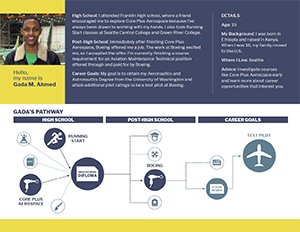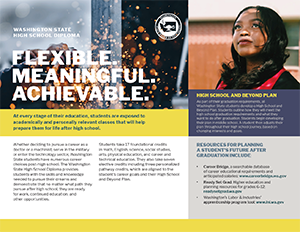Staff Contacts
Linda Drake
The State Board’s vision is of an education system that prepares all students for college, career and life. In support of this vision, the Board has worked to create a high school diploma requirements that are both rigorous and flexible. In Washington, high school students must meet credit requirements, graduation pathway option requirements, and have a High School and Beyond Plan.
The Washington State High School Diploma:
Along with new credit requirements, the state's assessment system, the Smarter Balanced assessments, are aligned to career and college readiness and new learning standards. These tests will have performance Levels 1, 2, 3, and 4. Earning a Level 3 or Level 4 on the high school Smarter Balanced tests represents a career- and college-ready score. In August 2015, the Board has set a score for graduation that is below a Level 3 so that the transition to new assessments required for graduation can be fair to students, but it remains a goal of the Board that all students will earn at least a Level 3 on the high school Smarter Balanced exams. The graduation score is the score students must meet for the Smarter Balanced graduation pathway option. As students and the system adjust to new standards and new assessments, the Board expects to see all students scoring at a Level 3 or above. All students will continue to take the Smarter Balanced assessments (even if they plan to use a different pathway to meet their graduation pathway requirement) for state and federal accountability purposes, as well as to ensure the system is serving all student groups equitably.
The Board believes that new credit requirements and new learning standards, combined with the excellent work of Washington’s educators and schools, will help all students graduate prepared for their next steps in life.
The State Board of Education sets state credit requirements and local districts may set additional requirements. The Legislature identified the tests students must take to graduate, and the Board sets the scores students must earn on those tests.
Background
In 2006, the Legislature directed the SBE to revise the definition of the purpose and expectations of a public high school diploma. In 2010, after extensive committee work, stakeholder input, and research the SBE adopted by resolution (but did not implement) 24 credit Career- and College-Ready Graduation Requirements. RCW 28A.230.090 provides that changes in graduation requirements having a fiscal impact on school districts may be implemented only after funding and authorization by the Legislature. In 2012, graduation requirement rules (WAC 180-51-067) were adopted by the SBE for the Class of 2016 and beyond, which included only changes that had no state fiscal impact.
In 2013, the budget passed by the Legislature included funding for increased instructional hours associated with the Career- and College-Ready Graduation Requirements, but the Legislature did not approve implementing the increased credits. The Board passed a resolution on January 9, 2014, that modified the 24 credit graduation framework to increase flexibility and personalization while maintaining rigor.
In the 2014 session, the Legislature passed E2SSB 6552 that directed the SBE to adopt rules to implement the Career- and College-Ready Graduation Requirements adopted in the board resolution of November 10, 2010, and revised on January 9, 2014. The legislation also reallocated funding to more directly support the new requirements. The Board adopted rules to E2SSB 6552 on July 10, 2014. A concise explanatory statement was prepared in accordance with RCW 34.05.325.
Applications for Waiver of Implementation of the 24 Credit Framework for Up to Two Years
RCW 28A.230.090 (1) provides that school districts may apply to the State Board of Education for a waiver to implement the Career- and College-Ready Graduation requirements adopted in 2014 beginning with the graduating class of 2020 or 2021 rather than the graduating class of 2019. The SBE is directed to grant such waiver to an applying school district at the next subsequent meeting of the Board after receiving an application. (E2SSB 6552. Chapter 217, Laws of 2014.) WAC 180-51-068 (11) implements this provision. An application for a waiver under WAC 180-51-068 (11) that is received by the SBE before the first day of a scheduled board meeting will be considered by the Board at that meeting. The Board requests, however, that applications be received at least ten days before a scheduled board meeting in order that they may be included in the printed materials prepared for the meeting. For a list of schools with current graduation requests, visit the Waivers page.
Graduation Requirements for the Classes of 2016 - 2018
The Board adopted graduation requirements for the Classes of 2016-2018 at its November 2011 meeting, creating WAC 180-51-067.This rule requires students to earn 20 credits, and including 4 credits of English and 3 credits of social studies.







